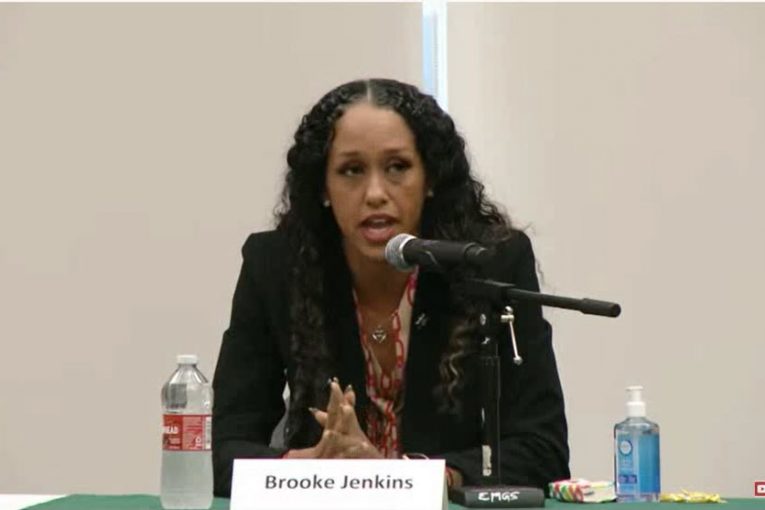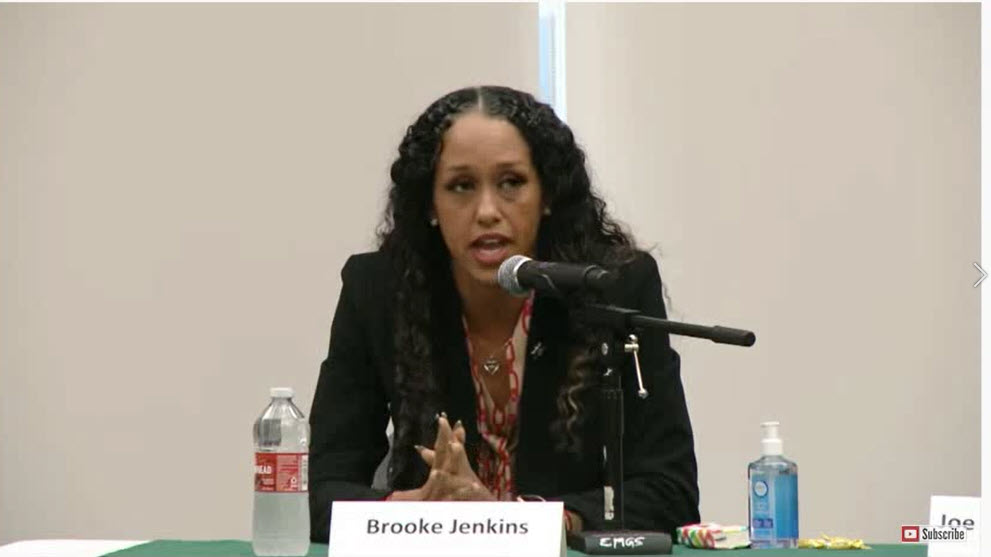

By David M. Greenwald
Executive Editor
San Francisco, CA – Former Assistant DA in the San Francisco District Attorney’s Office Lexa Grayner filed a bar complaint against DA Brooke Jenkins this week—at least the third known bar complaint against the DA.
In August, Grayner resigned as ADA, where she had prosecuted ghost gun distributors and large environmental polluters.
The complaint lays out three different forms of misconduct. First, “in October 2021, prior to her appointment as District Attorney, then-ADA Jenkins committed multiple misdemeanors when she unlawfully accessed and shared Troy McAlister’s rap sheet to support the recall campaign.”
There is a hearing set for this week as the Public Defender’s Office is now seeking to disqualify the DA’s office from prosecuting the McAlister case.
Second, “Jenkins unlawfully disclosed to the press information from a minor’s juvenile criminal record in violation of established law protecting juvenile records.”
Third, “Jenkins has repeatedly made extrajudicial statements in official press releases that she knows or should know have a substantial likelihood of materially prejudicing criminal proceedings  litigated by her office.”
litigated by her office.”
The first complaint is the best known of the three. It has been the subject of other bar complaints as well, but in October 2021, she was still at the DA’s office but had announced her resignation. “On that date, Jenkins sent an email from her official SFDA email account to the personal email address of another District Attorney, Don du Bain, who had also already announced his resignation.”
As the complaint notes, “Neither Jenkins nor du Bain had ever been assigned to the investigation or prosecution of Troy McAlister nor had ever helped or worked on his case in any capacity as prosecutors.”
Grayner notes, “To my knowledge, Jenkins has not proffered any justification as to why she, as an Assistant District Attorney with no official business relating to Troy McAlister, accessed his rap sheet one week before departing the office. Nor has Jenkins publicly explained why she emailed the same to the private email address of a colleague who also had no official business with the case, and who had also announced his intention to leave the office.”
She adds, “Jenkins knew that she was not authorized to access McAlister’s rap sheet without an official reason, but she was motivated to obtain a copy of the rap sheet to use in the campaign to recall her former boss.”
On January 10, 2023, McAlister filed a motion to disqualify the entire SFDA’s office from his criminal case. Grayner cites the Rule of Professional Conduct 8.4 and argues, “Jenkins’ criminal acts accessing and sharing McAlister’s rap sheet for political gain reflect adversely on her honesty, trustworthiness, and fitness as a lawyer, constituting professional misconduct under Rule 8.4(b).”
Grayner furthers alleges that she committed misconduct when she disclosed a minor’s criminal history.
On January 4, 2023, two boys, aged 14 and 15 years old, allegedly murdered a security guard in the Fillmore District of San Francisco.
Jenkins issued a written statement regarding the 15-year-old: “In a previous case involving this minor, my office sought to intervene by seeking to hold him in custody where he could have begun rehabilitative services. Sadly, the court ruled otherwise.”
Grayner alleges that the statement violations Welfare and Institutions Code § 827(a)(4) in three different ways.
First it publicly acknowledges the existence of “a previous case involving this minor,” when “Jenkins disseminated information relating to the minor’s juvenile case file.”
Second, “by writing that her office ‘sought to intervene by seeking to hold him in custody,’ Jenkins disseminated information relating to the State’s motion to detain the minor in the previous case.” Argues Grayner, “the motion constitutes part of the juvenile case file.”
Third, “Jenkins’ statement that ‘the court ruled otherwise’ disseminates information relating to the court’s ruling on the State’s motion to detain. The court’s ruling would also take the form of a written ‘document filed in a juvenile court case,’ or an oral ruling from the bench reflected in ‘transcripts … released by the court,’ or both.”
The third complaint relates to AN ISSUE THAT Jenkins has frequently made extra judicial prejudicial statements about criminal defendants in active cases.
As the Vanguard has noted on a number of times, a standard refrain has been that the defendant “will be held accountable for these crimes,” presuming guilt among other things.
For instance, ““Vargas-Osorio will be held accountable for these crimes, as senseless unprovoked, violent attacks are completely unacceptable and will not be tolerated, said District Attorney Brooke Jenkins. Although I am grateful no one was harmed, attacking on duty EMTs endangers all of us as we depend on these brave individuals to render life-saving aid when we are at our most vulnerable, and in desperate need of medical attention.”
Grayner’s complaint cites examples of at least 12 such cases where she presumes guilt and vows to hold the defendant accountable “for (their) crimes”—again presuming guilt.
Under the Rule of Professional Conduct 3.6(a) it “prohibits attorneys from making extrajudicial statements about cases that they know or reasonably should know will (i) be disseminated by means of public communication and (ii) have a substantial likelihood of materially prejudicing an adjudicative proceeding in the matter.”
Grayner argues, “Jenkins should also know that the information included in many of these press releases has a substantial likelihood of materially prejudicing active criminal cases litigated by her office.”
In a fentanyl press release, Grayner notes that the defendant was alleged to possess around eight pounds of fentanyl, and Jenkins said that this is “an amount [of fentanyl] sufficient to kill more than the entire population in San Francisco.”
Grayner charges, “Jenkins cites no evidence to support her inflammatory statement to the press and public. This fact is completely irrelevant to the criminal case, and clearly inadmissible as evidence to prove any material fact in issue, such as the defendant’s possession of the substance, knowledge of the substance, intent to distribute, or his guilt.”
But Grayner notes that “almost every major news broadcasting agency operating in the Bay Area reported on Jenkins’ inflammatory quote.”
Grayner concludes, “Each of these violations poses an individual threat to the administration of justice in San Francisco. Collectively, they present an alarming problem: a top prosecutor disregarding the rules of ethics, tainting jury pools, and jeopardizing the rights of criminal defendants to obtain fair and impartial justice.
“Still worse, Jenkins has a clear motive to commit these violations in bad faith: to advance her political career.”


Jenkins must be removed from office ASAP.